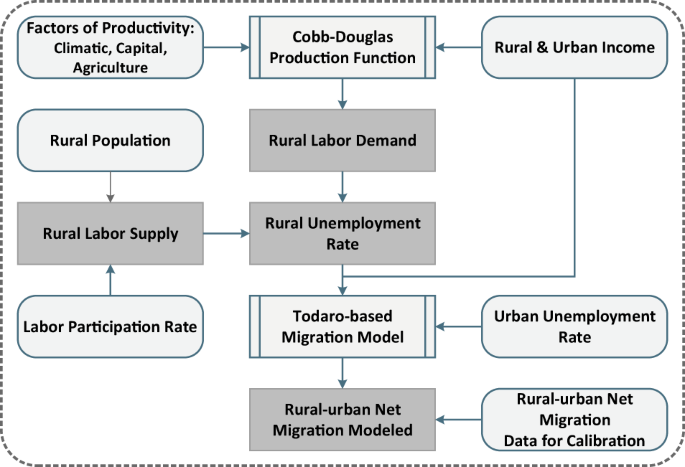
This article examines rural-urban migration its role in poverty alleviation in Thailand and policy implications. This article examines rural-urban migration its role in poverty alleviation in Thailand and policy implications.

Man space and environment.
Systems approach to a theory of rural urban migration. Systems Approach to a Theory of Rural-Urban Migration In the growing literature on the study of migration two theoretical issues have attracted the greatest attention namely why people migrate and how far they move. A simple model for explaining the reasons why people move has been formulated in terms of the pull-. A systems approach to rural urban migration is concerned with why people migrate and with all the implications and ramifications of the process.
Use the link below to share a full-text version of this article with your friends and colleagues. Systems Approach to a Theory of RuralUrban Migration Mabogunje Akin L. 1970-01-01 000000 Akin L.
Mabogunje is a professor of geography at the University of Ibadan Nigeria. Geographical Analysis areas 0. 2 But it will be shown that this type of movement represents a very special case of rural-urban migration.
To make the point clear i t is necessary to offer a definition of the latter. A systems approach to rural urban migration is concerned with why people migrate and with all the implications and ramifications of the process. The approach is designed to answer such questions as.
Why and how does an essentially rural person become a permanent city resident. What changes does heshe undergo in the process. And what effects have these changes both on the rural area from.
Systems approach to a theory o. Systems approach to a theory of rural-urban migration. Man space and environment.
Concepts in contemporary human geography. - New York ua. Check Google Scholar More access.
We use migration system theory to understand ruralurban migration in Malawi. Ruralurban migration is currently permanentnon-circular but this may change. Climate change may undermine rural livelihoods reducing capital used for migration.
Urbanites depend on rural productivity and feel impact of rural and urban stress. Climate change may prevent and reverse urban migration rather. Todaros Theory on Rural-Urban Migration.
Todaro accepts the logistics of Lewis-Fei-Ranis model of rural-urban migration but only with reservations. According to him this theory may correspond to the historical scenario of migration in the western socio-economic milieu but does not explain the trends of rural-urban migration in less developed countries. He applies the systems approach to ruralurban migration within the African continent as a way of explaining why and how a rural migrant becomes a permanent urban dweller Mabogunje 1970.
Mabogunje was not the only migration scholar 2 applying general systems theory to the analysis of migration but he provided the clearest explanation of how the systems dynamics change the pattern. Systems approach to a theory of rural-urban migration. Geographical Analysis 21 118.
Article Google Scholar Martin P. L Taylor J. The anatomy of a migration hump.
Taylor Ed Development strategy employment and migration. Insights from models pp. A Theory on the Urban Rural Migration Theodore Papaelias1 Abstract.
The internal migration consists one of the major problems that a geographical region faces during the transition process from the traditional way of production to the modern one. Therefore it attracts wide attention in contemporary literature. The purpose of this essay is.
The theoretical framework imbeds the urban economists monocentric-city model in an economy experiencing rural-urban migration. In the empirical work the. Todaros R-U Migration Model Factors affecting migration decision Expected urban income Probability of finding an urban job Cost of living in urban areas Decision criterion.
Migration will take place if the present value of expected benefits exceed costs 7-30. The Worlds System Theory argues that penetration of capitalist economic relations into non-capitalist or pre-capitalist societies creates a mobile population that can easily make a decision to migrate DS. The last theory to present is called the Social Capital Theory.
It is a theoretical model explaining international migration through presenting a concept of migrant. Classic migration theories have large influence on understanding ruralurban migration in China. In this chapter firstly four migration theories are reviewed in detail including Ravensteins laws of migration Lees general theory of migration Zelinskys stage theory and Mabogunjes systems approach to ruralurban migration.
Secondly this chapter gives a brief portrait of Chinese farmers ruralurban migration. Systems approach to a theory of rural-urban migration in Systems behaviour 2nd ed. Application géographique de la théorie des systèmes aux migrations entre la ville et la campagne.
Identification logique de sous-systèmes et de leur fonctionnement. Dans ce système particulier lénergie. Micro theories of migration have generally been tested with data which do not allow one to distinguish between the decision to move and the act of moving.
The latter is usually treated as a proxy for the former. Using data from a two round survey of youth in rural Kenya we classify respondents as decision processorsnondecision processors from round one data and determine who migrates over a. This article examines rural-urban migration its role in poverty alleviation in Thailand and policy implications.
The empirical research literature suggests that the poorest tend be left behind by wealthier migrants moving to urban areas. The youngest tend to migrate. The impact of remittances tends to appear more positive in international migration but the impact of remittances among rural.